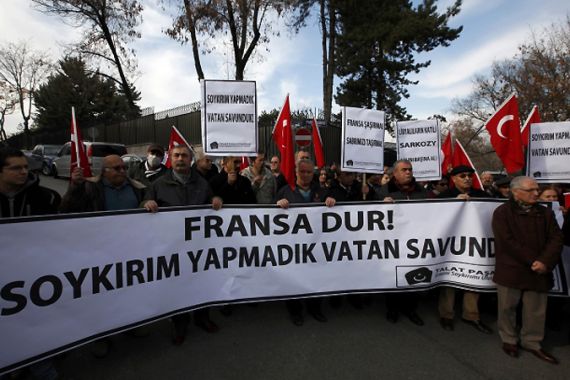Turkey calls on France to halt genocide bill
Ankara says adoption of law making it illegal to deny killing of Armenians in World War I will spark crisis.

 |
| Turks in Ankara and elsewhere oppose a French draft law criminalising the denial of the Armenian genocide [Reuters] |
Turkey has piled pressure on France to drop a proposed law making it illegal to deny that Turkey’s Armenian population suffered a genocide, warning its adoption will spark a diplomatic crisis and have economic consequences.
The French parliament is to debate the bill on Thursday, which would see anyone in France who publicly denies a genocide face a year in jail and a fine of $58,000. Parliament is expected to approve the bill.
Armenia says up to 1.5 million of its people were killed during World War I by the forces of Turkey’s former Ottoman Empire, a figure Ankara disputes.
As a delegation of Turkish legislators and businessmen met officials in Paris on Tuesday, Abdullah Gul, Turkey’s president, urged France to drop the bill.
“It is not possible for us to accept this bill, which denies us the freedom to reject unfair and groundless accusations targeting our country and our nation,” Gul said in a statement from Ankara.
“I want to hope that France will not sacrifice centuries-old Turkish-French friendship, common interests and bonds of alliance for small political calculations,” Gul said, alluding to next year’s elections in France.
The Turkish delegation met with Alain Juppe, France’s foreign minister, and President Nicolas Sarkozy’s foreign policy adviser Jean-David Levitte, arguing the law was an attempt to win support among voters of Armenian origin.
“Mr Alain Juppe reminded his guests that Turkey is for France a friend and ally, with which it has always sought dialogue,” the foreign ministry said.
Juppe told the Turkish delegation that Paris and Ankara have many vital common interests and argued these were “sufficiently strong to overcome the challenges that might confront or relationship”.
France has a large population of Armenian descent seen as an important element of Sarkozy’s support base as he prepares for a tough re-election battle in April next year.
“Every five years this question comes up ahead of the elections,” Umit Boyner, a member of the delegation and chairperson of the Turkish Industry and Business Association, said.
“If this law is adopted, there will be a lot of damage and consequences for the two countries,” Rifat Hisarciklioglu, the head of the Turkish Union of Chambers and Commodity Exchanges, who was leading the delegation of Turkish business people, warned.
‘Irreparable’ consequences
Turkey has urged France to block the bill, or face “serious and irreparable” consequences for Franco-Turkish relations.
Turkey is an important economic partner for France with about 12bn euros in trade between the two countries in 2010.
A Turkish government source told the AFP news agency on Tuesday that it would impose diplomatic and trade sanctions on Paris if French legislators adopted the law.
“Turkey will not remain silent. That will obviously have consequences,” the source said. “We have already discussed our plans if the bill is adopted at the French National Assembly on Thursday.”
Among the sanctions, Turkey will recall its ambassador to Paris for consultations and ask the French ambassador in Ankara to leave, the source said, speaking on condition of anonymity.
Ankara is also planning trade sanctions targeting French interests in the country, though the government has so far avoided openly using the term of “boycott” against French products.
Close to 1,000 French companies in Turkey, as well as those in partnership with Turkish companies, will be excluded from public contracts, especially in the field of transport, according to the source.
But the French foreign ministry spokesperson, Bernard Valero, said Turkey was bound by international agreements not to discriminate against French companies.
Turkey “is a member of the World Trade Organisation and is linked to the European Union by a customs union agreement. These two legal commitments require non-discrimination in regards to EU companies,” the source said.
Turkey rejects the term genocide and says between 300,000 and 500,000 Armenians, and at least as many Turks, died in combat or from starvation when Armenians rose up and sided with invading Russian forces.
Most historians agree that between 500,000 and 1.5 million Armenians died in a series of massacres and deportations from Asia Minor in the Ottoman Empire in 1915 and 1916.
France recognised the killings as genocide in 2001.